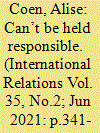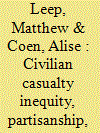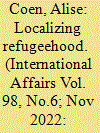| Srl | Item |
| 1 |
ID:
178498


|
|
|
|
|
| Summary/Abstract |
States have increasingly moved away from refugee protection, intensifying the vulnerability of refugees and asylum-seekers. Drawing on theories of norm dynamics within International Relations (IR), this article argues that departures from refugee protection can be partly explained by the weakness of the normative principles governing the treatment of individuals fleeing persecution. Ambiguities, diverging interpretations, and varying levels of codification complicate efforts to hold states accountable to a complex bundle of human rights standards surrounding refugee and asylum protection. These weaknesses in the international refugee regime bolster norm-evading behavior wherein governments deliberately minimize their obligations while claiming technical compliance. Drawing on an analysis of US refugee and asylum policies under the Trump administration, the article reveals how norm evasion and accountability challenges emerge in the context of ambiguous standards vis-à-vis non-refoulement, non-detention, non-penalization, non-discrimination, and refugee responsibility-sharing.
|
|
|
|
|
|
|
|
|
|
|
|
|
|
|
|
| 2 |
ID:
144296


|
|
|
|
|
| Summary/Abstract |
Research into how civilian casualties influence public opinion largely focuses on citizens' support for the use of force by their own countries. This study explores how civilian casualties and partisan cues shape support for the use of force by an ally in a foreign conflict. Specifically, it assesses the effects of civilian casualty inequity – the uneven distribution of civilian casualties across two sides in a conflict – on Americans' support for Israel. Drawing on an original survey experiment conducted during the 2014 Israel–Gaza conflict, the article bridges work on inequity aversion theory, party identification, and social identity theory. It finds that civilian casualty inequity information reduces support for Israel, particularly among Independents. The study also finds that adding explicit partisan criticism cues to civilian casualty inequity information does not appear to induce motivated evaluations of Israel among Republicans or Democrats. An important implication is that under conditions of greater media coverage of civilian casualty inequity, Americans – particularly Independents – might become less supportive of Israel even in the absence of elite criticism of Israel.
|
|
|
|
|
|
|
|
|
|
|
|
|
|
|
|
| 3 |
ID:
189238


|
|
|
|
|
| Summary/Abstract |
A central challenge for the study of norms in International Relations entails understanding how meaning is enacted through use and local context. Amid trends towards governments reducing pathways of humanitarian migration, local constructions of meaning around refugeehood and the obligations owed to people fleeing persecution can influence global trajectories of containment and responsibility-sharing. As a means of advancing our understanding of norm localization and contestation, this article provides an account of how obligations around refugee protection are configured and contested among national and subnational authorities. Using a case study of discourses (re)produced among United States' federal, state and municipal leaders, it explores the multiple, complex layers of meaning which emerged around duties of care owed to foreign civilian ‘allies’ in the context of the 2021 Taliban takeover of Afghanistan. Beyond illustrating dynamics of localization and contestation, the article shows how domestic resistance to norm implementation can operate as a surrogate for wider visions of resisting liberal international principles. The case study more broadly contributes to understanding the conflicting logics associated with duties of care in the aftermath of military interventions.
|
|
|
|
|
|
|
|
|
|
|
|
|
|
|
|